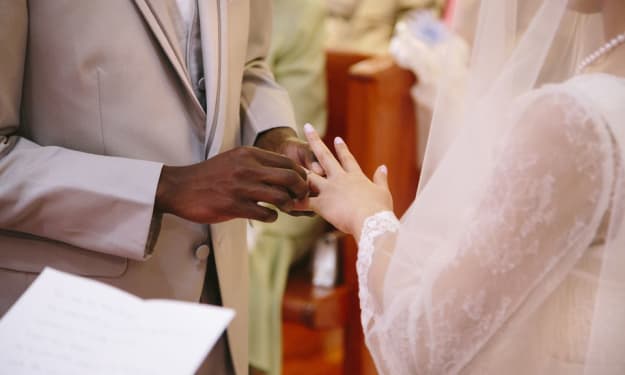As a Woman, I Take Pride in My Historical Patchwork Quilt
I have been on a Tramline in Manchester and heard one woman discussing a trip she would soon be taking to Liverpool, only for her friend to respond fearfully and say, “Hold onto your purse while you’re there!”

"It’s no-thing, not no-uhn. Abbie, how do you say it?” My relaxed spring day has been interrupted, not by the chirping of birds or the mowing of grass, but by a debate that has plagued my multi-dialectal house for almost a decade. I respond to my step-father with the reply I always give when I am asked, as if one day the answer will change: I say ‘no-uhn’. Despite my honesty, I am met with a look I can only describe as the parental ‘I’m not angry, just disappointed’ glare. “But that’s wrong! There’s a ‘T.’” My mum returns fire as I play the part of an umpire in an impassioned verbal tennis match. “It’s wrong to you, but that’s the way we say it, so it’s right!”
This is a common moment. At least once a week, there will be some light-hearted ridicule over the way myself or my mother pronounces a word. It is the dropping of the letter T that sends him loopy; “Mountain has a T in it! It’s not moun-uhn!” I remind him carefully that there’s no stopping the glottal stop; it is what replaces the T in certain words with a small pause (and is the sound that haunts his nightmares). Frankly, I find his stern correction of my dialect amusing. I have never, personally, had any experience of ridicule outside the walls of my home because I don’t think of myself as having a particularly strong accent. In fact, I have had encountered more people informing me that, if they didn’t already know I’m from Liverpool, they would assume otherwise. “Posh Scouse” has been the phrase used most commonly to describe my accent, yet I know now this to just be Modified RP (my regional accent has modified itself to something considered more prestigious! Hurrah for the Queen's English! Pip Pip! Cheerio!).
When I was younger, there came a point where I grew tired of hearing this comment. After all, I have a fondness for Liverpudlian dialect; it reigns in the place I was born, grew up and still reside in. To be told I didn’t sound like I was from my home city felt insulting. Why should my slightly (albeit, obvious, in the face of stronger accents) posher voice separate me from the city in which I have spent my whole life? So I converged; in my younger years of secondary school, I decided a great idea would be to modify my accent to be more a-typically Liverpudlian and stop an onslaught of future comments. I pronounced my h’s more harshly, my t’s more quietly, and thereby my posher accent disintegrated. To add to this, the use of slang gave me a sense of covert prestige; to go against this standard English and be more outwardly, more obviously, Liverpudlian. Yet at home, to emphasise the differences between my actual accent and my new, extra-strength one, I downwardly diverged to rebel against the poshness that had made me the subject of ridicule and speculation amongst my peers. This was, until my mother rightly informed me that I sounded ridiculous and that there was nothing wrong with the way I spoke. That we should be proud of our accent no matter what, because it is integral to our identity. And to that, I can say, I deffo agree.
Despite this, something I know to be an annoyance of many is the grammar of dialect; Scouse grammar in particular. Again, I have personal experience in this area: if I had one pound for every time I have been scalded for using ‘youse’ as a collective pronoun, I would be able to fund three years worth of university tuition fees without the aid of a student loan. But then, we encounter the contrasting argument: Shakespeare is noted as having used ‘youse’ in this form, as have many authors who spoke in Middle English. Who are we to tell the grandfather of English Literature he is wrong? I, for one, will not be correcting him.
I like to think our Scouse vernacular is particularly charming; regional accents have a certain warmth to them that others lack, something I have not relinquished using in my argument against the supposed superiority of the Received Pronunciation (RP) accent. (This is the accent taught in elocution lessons, the pronunciation taught to those studying English as a foreign language, and how you will hear Queen Liz speak if you tune in for the Christmas Day speech.) Howard Giles’ “Matched Guise Technique” has become a veritable goldmine in showing the warmth and honesty people associated with Northern accents and the cold, ruthlessness of RP. Yet this warmth is often tarnished by those with cruel stereotypes. I often wonder if people with RP accents face similar experiences. Even in my own home, I am subjected to a re-run of Harry Enfield’s “Calm down, calm down,” when I am irate. I have been on a Tramline in Manchester and heard one woman discussing a trip she would soon be taking to Liverpool, only for her friend to respond fearfully and say, “Hold onto your purse while you’re there!” I don’t know what we can do to alter these stereotypes other than refute them. Yes, there will be those Liverpudlians who may steal your purse. But the majority of them will not. Just the way there will be those who speak in RP, drinking tea, wearing a monocle and top hat whilst twirling a cane. But the majority of them will not. (Below is a clip taken from Harry Enfield & Chums, which will perfectly explain the most commonly acknowledged Liverpudlian stereotype.)
In my humble opinion, I don’t think it is right for us to draw faults and criticisms in others accents and dialects. They are just part of our historical patchwork quilt—where we’ve come from, where we’ve been and ultimately where we’re going. I have learnt to love how I speak and now, the opinions of others mean absolutely ‘no-uhn’ to me.
About the Creator
A. Andrews
☕️.






Comments
There are no comments for this story
Be the first to respond and start the conversation.